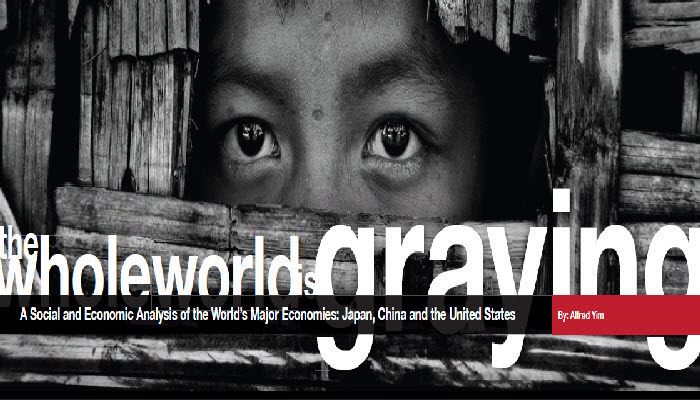An Aging World = Social and Economic Timebomb
The Whole World is Graying
A Social and Economic Analysis of the World’s Major Economies: Japan, China and the United States
Alfred Yim, Staff Writer
Ryan Trinidad, Art Director

The issues of life and death are usually reported in the media only when something extraordinary or bizarre occurs. However, death and birth, far from being just interest stories, represent the continuous renewal and loss of life that subtly shapes the face of our society. As the collective human organism of a nation ages, the demographics of the country changes, potentially bringing about a new set of issues to contend with.
These changes will be examined in the three largest economies in the world: Japan, China and the United States. The potential effect of a little salt and pepper in their population mix will be discussed as it relates to each country’s international competitive advantage.
The Good Life Redux
A blend of economic and social effects has set Japan on a course for population decline.Japan has been suffering ever since the burst of its economic bubble (from 1985 to 1990). The resultant downsizing and necessary cost cutting destroyed the warm notion of lifelong employment and company loyalty that used to exist.
With opportunities for employment diminished and with sustained employment a dashed dream, today young people who finally finish their long years of education are presented with a very bleak reality. Expectations people might have had about moving out of the ancestral home, owning a home of their own, finding a spouse and having a successful career are adjusted to accommodate the harshness of reality.
The stagnant environment has resulted in people giving up on achieving the three pillars of a ‘good’ life: education, a career and a family. Evidence of the first pillar being disregarded is the large number of youth who put little importance on excellent academic performance, which leads to non-participation in post-graduate studies.
The second pillar of a career is forsaken in favor of taking up non-stressful/dead-end part time jobs. Current estimates of the voluntarily under-employed number over 4 million.
Lastly, the third pillar of having a family is given up in light of the financial infeasibility of having one and the fact that workplace policies, in regards to prospective mothers, are discouraging. In short, depressed economic conditions have in part dissuaded couples from having children – the Japanese government is actually paying for people to have children.






























Share the post "An Aging World = Social and Economic Timebomb"